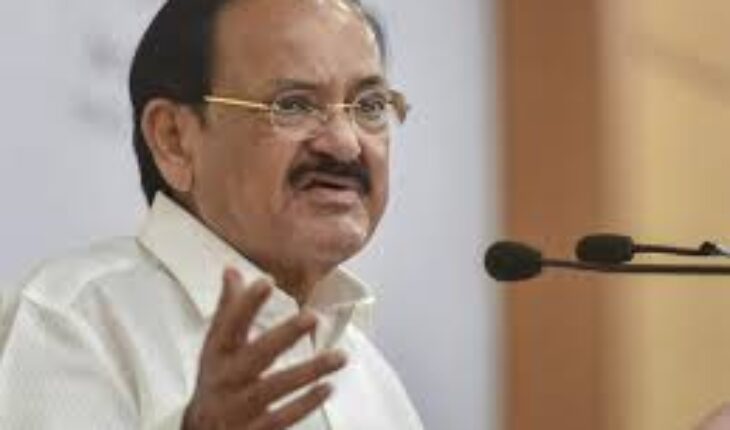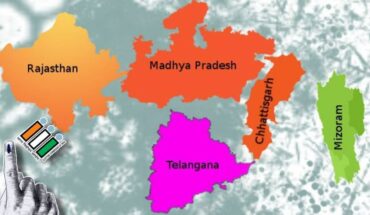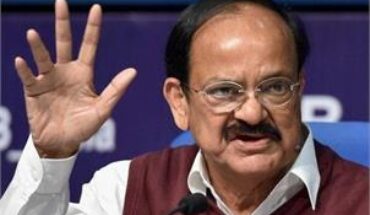By Dominick Rodrigues
Hyderabad : The Vice-President M. Venkaiah Naidu has lauded the efforts of the DRDO’s Scientists and Technologists by describing their caliber and commitment as capable of making India so self-reliant that the “Atma Nirbhar Bharat” clarion call will change to “Bharat Par Nirbhar.” (dependent on India).
Naidu was addressing the scientific community during inauguration of two new facilities — a Missile System Review Hall and Air Commodore V Ganesan Integrated Weapon System Design & Development Center — at the Dr APJ Abdul Kalam Missile Complex in Hyderabad today, where he also visited the Exposition of Technologies by Missile Complex Laboratories to see the indigenous products.
“Attaining self-reliance in the defence sector is not only of critical or strategic importance for the country, but is also essential in terms of national pride and means that now India is now self-reliant in this kind of missile system where the armed forces need not import similar missile systems,” he said while lauding the efforts of the DRDO scientists and engineers in bringing India near to self-reliance in missile technology.
Referring to the limitations faced by India in having access to high-end missile technology of developed countries prior to the signing of Missile Technology Control Regime (MTCR) in 2018, Naidu said that DRDO turned this crisis into an opportunity by developing a range of indigenous missile systems and self-reliant technologies that give boost to the local industry, generate employment opportunities and earn valuable foreign exchange.
Referring to the rapidly-changing technological landscape, the Vice President asked DRDO to redefine its focus on strategic defence technologies and outsource activities which can be carried out by capable private sector participants.
“While India is now focusing on shifting its status from being one of the largest importers of defence products to becoming one of the top exporters of defence items, its defence exports still remain very low — despite the recent seven-fold increase – with there being huge scope for developing export-value defence technologies that scientists and technologists should identify in India’s futuristic defence needs alongside exportable technologies,” he said, while praising the. DRDO’s setting set up of 8 advanced technology centers to carry out research on futuristic military applications.
“The defence technology ecosystem of India has given confidence to the government to ban the import of 101 weapons, platforms, and equipment in next five years. The government has also set up a target of achieving defence exports worth Rs 35,000 crore in next four years.”
Highlighting DRDL’s role in India’s Missile technology development since inception in 196, Naidu noted the contribution of stalwarts like Dr. Kalam in the success of Integrated Missile Development Program (IGMDP) and his personal association with the former President where he was struck by his simplicity, his depth of knowledge and deep desire to make India a Superpower, besides his legacy being maintained by scientists of the missile cluster of DRDO in developing new generation, state-of-the-art missile systems.
He said these scientists worked hard in meeting important milestones of the missile development programmes – amidst challenges posed by Covid-19 pandemic – for commendable achievements like the successful trials of QRSAM (Quick Reaction Surface-to-Air Missile), MRSAM (Medium Range Surface-to-Air Missile) SAAW (Smart Anti-Airfield Weapon), SMART (Supersonic Missile Assisted Release of Torpedo) and MPATGM (Man Portable Anti-Tank Guided Missile), NGRAM (New-Generation Anti-Radiation Missile) using Passive Homing Head Seeker; Programme Controlled flight trials of HELINA, user assisted trials of NAG, flight trials of BrahMos using indigenous booster, Land version and technology demonstration of Hypersonic Cruise Flight for 20 second duration for HSTDV.
While urging for encouraging womens’participation in the field of science and technology. Naidu said the unprecedented disruption caused by COVID-19 pandemic has affected the people from all sections, particularly the poor, while scientists had come up with the vaccine in a record time amidst hopes of it reaching every citizen of India and ending the pandemic.
Praising farmers especially for record foodgrain production of 296.65 million tonnes in 2019-20 despite hardship caused by pandemic restrictions, Vice-President said India’s fight against COVID-19 reads like a successful story of containing the virus in which the valiant heroes included the people of India, police forces, medical fraternity, scientists and technologists and providers of essential commodities and services, that supported the national cause wholeheartedly despite facing risk of infection.
Recognising that the pandemic has severely affected the economy and livelihoods, he said that it has also offered an opportunity to establish India’s strength and capabilities where rapid production and export of indigenous vaccines, PPE kits and healthcare systems demonstrated its strengths in building an Atma Nirbhar Bharat.
Naidu also praised the DRDO for its wholehearted support in battling coronavirus by providing many innovative technology solutions. “The establishment of a 1000-bed hospital in barely 12 days illustrates DRDO’s capabilities and speedy response in war-like situations,” he said.
Home Minister of Telangana, Md. Mahmood Ali, Chairman DRDO, Dr. G Satheesh Reddy, Director General (Missile & Strategic Systems), MSR Prasad, scientists of DRDO were among those present.




